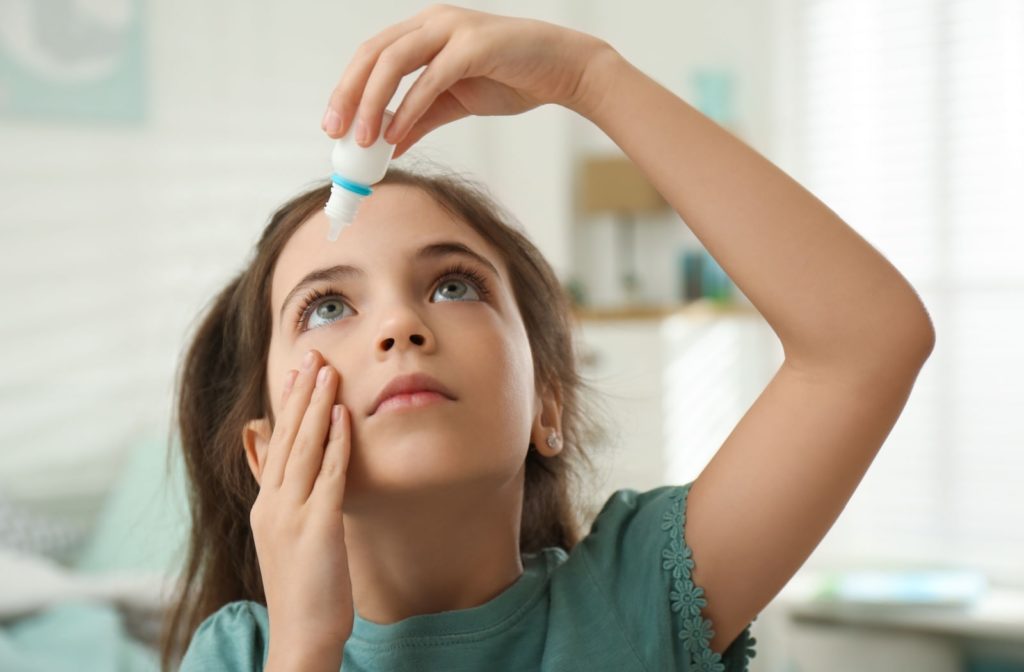Atropine eye drops are a proven mainstay in ophthalmology, offering relief and treatment for various eye conditions and treatment for myopia.
The duration for which atropine eye drops are used can vary depending on individual circumstances and the recommendation of an eye care professional. Typically, atropine eye drops are prescribed for myopia control in children and adolescents, and the treatment duration can range from several months to a few years.
What Are Atropine Eye Drops Used For?
Atropine is an anticholinergic medication that has been traditionally used to dilate pupils during eye examinations. More recently, its utility has expanded. Low-dose atropine eye drops can help slow down the progression of myopia by temporarily relaxing the eye’s focusing mechanism.
Duration of Atropine Eye Drop Usage
Usage durations of atropine eye drops lie on a broad spectrum, dictated primarily by the condition being treated. For examinations, it’s short-term; for myopia control in children, it can be a long-term treatment. The decision on the length of use is influenced by several factors, including the patient’s condition and treatment objectives.
Potential Side Effects & Risks of Atropine
While many users tolerate atropine well, it is not devoid of side effects, such as
- Dry mouth
- Blurred vision
- Sensitivity to light
- Photophobia
- Tachycardia
- Flushing
- Hot skin
- Constipation
- Difficulty with urination
- Anhidrosis can occur, especially in at-risk populations (most notably, the elderly
- In rare cases, delirium or coma may occur
- Hypersensitivity reactions may occur
Particularly in the context of long-term usage, patients and healthcare providers alike must stay vigilant for any adverse effects, with regular assessments to catch any issues promptly.
Long-Term Effects of Atropine Eye Drops
One concern surrounding atropine usage is its long-term effects on the eyes. Since myopia often develops during childhood and adolescence, many are worried about the consequences of using atropine over an extended period. However, studies have shown that atropine does not cause permanent changes to the eyes. In fact, some studies have even suggested that atropine can improve eye health and prevent other ocular conditions.
Seek Immediate Treatment with These Atropine Side Effects
Atropine may cause blurred vision or dizziness, so it’s essential to avoid driving or operating machinery until you know how your body reacts to the medication. If you experience severe side effects such as difficulty breathing or a rapid heart rate, seek immediate medical attention.
Glaucoma or Eye Pressure Issues
In rare cases, atropine can lead to an increase in eye pressure, which can be dangerous for individuals with pre-existing glaucoma. If you have a history of glaucoma or other eye conditions, make sure to inform your doctor before starting atropine treatment.
Allergic Reaction to Atropine
In rare cases, individuals may experience an allergic reaction to atropine. If you have a known allergy to belladonna alkaloids or other similar medications, make sure to inform your doctor before taking atropine. Symptoms of an allergic reaction include rash, itching, swelling of the face/throat/tongue, severe dizziness, and trouble breathing.
When Should You Not Use Atropine Eye Drops?
Atropine should not be used by pregnant or breastfeeding women without consulting a doctor first. The effects of atropine on unborn babies and nursing infants are not fully understood, so alternative treatments may be recommended.
How Much Atropine Should You Administer?
It’s essential to follow the prescribed dosage and schedule for atropine. Taking too much or too little can result in adverse effects or reduced effectiveness of the medication. If you miss a dose, take it as soon as you remember unless it’s close to the time for your next scheduled dose. In that case, skip the missed dose and continue with your regular dosing schedule.
Atropine is a medication and should only be used under medical supervision. It can provide significant relief from certain conditions but can also have potential side effects and interactions with other medicines. Make sure to discuss all concerns and questions with your doctor before starting any new treatment regimen involving atropine. Remember to report any unexpected symptoms or adverse reactions while taking this medication.
Before Starting Atropine Eye Drops
Before starting atropine treatment, it’s important to inform your healthcare provider of any pre-existing medical conditions or allergies. Atropine may interact with certain medications, so make sure to disclose all current medications you are taking.
Here for Your Eye Care Questions
Reach out to our team at Eyes Harvest Hills to learn more about managing myopia and questions about treatment. We’re here to help you and your family see clearly and comfortably and to care for your long-term vision. Book an appointment today with our friendly team today.




